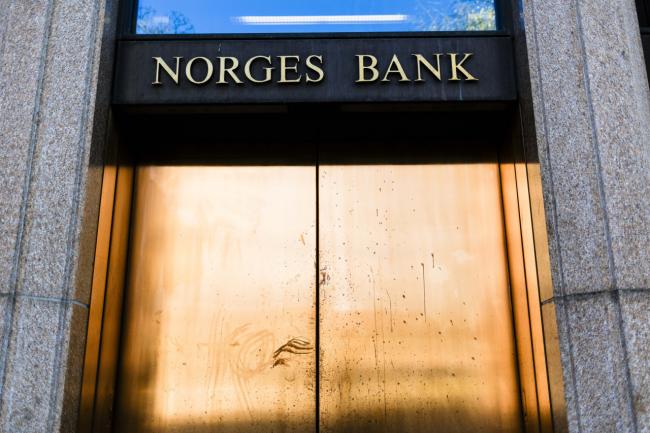(Bloomberg) -- Norway’s central bank raised its main interest rate for a second time since September and signaled there’s more tightening to come, as western Europe’s biggest oil exporter lets a rebound in crude prices steer monetary policy.
“Our current assessment of the outlook and balance of risks suggests that the policy rate will most likely be increased further in the course of the next half-year,” central bank Governor Oystein Olsen said in a statement on Thursday. Norges Bank, which is based in Oslo, raised its deposit rate by a quarter point to 1 percent, as expected by most economists.
The krone soared as much as 1.1 percent against the euro after the announcement, as markets took note of the very different monetary trajectory that Norway appears to be on versus its western counterparts.
Breaking Away
The picture in Norway is far removed from that in the euro zone and even neighboring Sweden, where central banks have had to take a more cautious approach toward tightening amid mixed economic signals. On Wednesday, the U.S. Federal Reserves signaled it won’t tighten policy at all in 2019, reflecting concerns over slowing growth.
Norway’s economy, which is backed by the world’s biggest sovereign wealth fund, is growing faster than a lot of its peers. Unemployment is below 4 percent and inflation is above target. What’s more, the krone has so far remained weak despite the country’s economic strength, which has given the central bank room to raise interest rates without hurting exports.
“The upturn in the Norwegian economy appears to be stronger than anticipated earlier,” the central bank said. “On the other hand, there are prospects for weaker growth and lower interest rates abroad.” The bank’s forecast for the pace of monetary tightening in Norway “indicates a slightly faster rate rise in 2019 and a somewhat lower policy rate further out” than signaled previously, it said.
“The Norwegian economy is expanding at a solid pace, and capacity utilization now appears to be slightly above a normal level,” Norges Bank said. “Underlying inflation is a little higher than the inflation target.”
“The uncertainty surrounding global developments and the effects of monetary policy suggests a cautious approach to interest rate setting,” the bank also said. “Overall, the outlook and the balance of risks imply a gradual interest rate increase ahead.”
(Adds central bank comment.)
